Leo Schofield writes a love letter to the courageous nurses on the COVID-19 frontline
Nurses have long worked incredibly hard and given much of themselves. Now, they’re being required to do even more than ever. Leo Schofield says thank you.
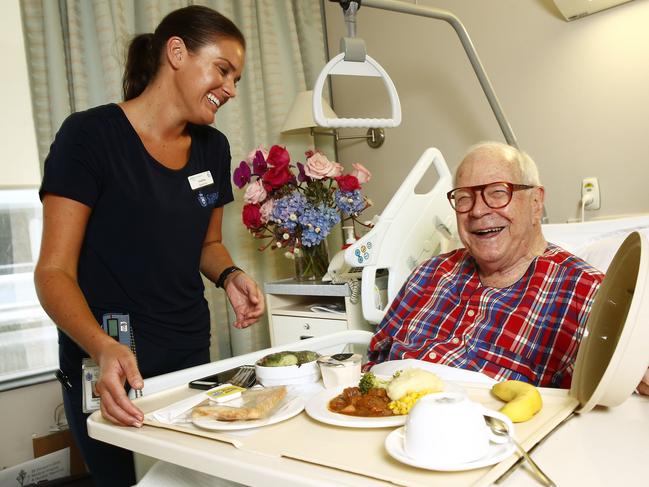
Local
Don't miss out on the headlines from Local. Followed categories will be added to My News.
• Bondi Beach and Bellevue Hill top Eastern Suburbs virus hot spots
• Multi-million dollar reno job on Point Piper mansion
Leo Schofield has been to hospital on several occasions (who hasn’t by the time they’ve hit adulthood) and accordingly he knows how they work on an intimate basis, St Vincent’s Hospital in Darlinghurst in particular.
The esteemed arts and food writer spent some time here recently for an operation and while unmoved by the cuisine, it’s a medical facility after all — not a dining destination — he was deeply impressed by the staff, in particular a nurse by the name of Courtney Bell.
Here, a look back at Leo and Courtney’s meeting at a time when we all need to consider how much nurses, doctors and health staff of all descriptions give and give and then, give some more.
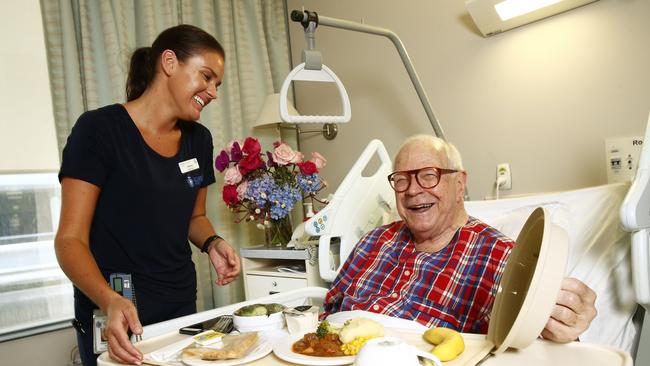
The quality of care in hospitals throughout NSW ranges from good to high to exceptional.
Eastern suburbanites are fortunate to live within striking distance of two of Sydney’s finest hospitals and as my operation is a bipartite one, surgery on both knees, followed by rehab, I kick off, so the speak, at St Vincent’s.
Something of an icon, St Vincent’s (it shares the affectionate appellation Vinnie’s with the related charity stores, although the private section is known as the Jesus Hilton) was founded by the Sisters of Charity in 1857.
It remains the city’s most famous hospital. It might also be seen as the institution that ate Darlinghurst, for it has grown phenomenally over the past decades, largely due to magnificent benefactions. It seems to be in a permanent state of construction.
Keen while a patient there, not to break the pattern of weekly Wenty lunches I arranged to share a post-op midday meal with one of the splendid nurses who looked after me, one Courtney Bell. The nuns of course have long gone, replaced by a virtual United Nations of nurses, many of them bubbly young women who embody enthusiasm, dedication and competence in equal measure.
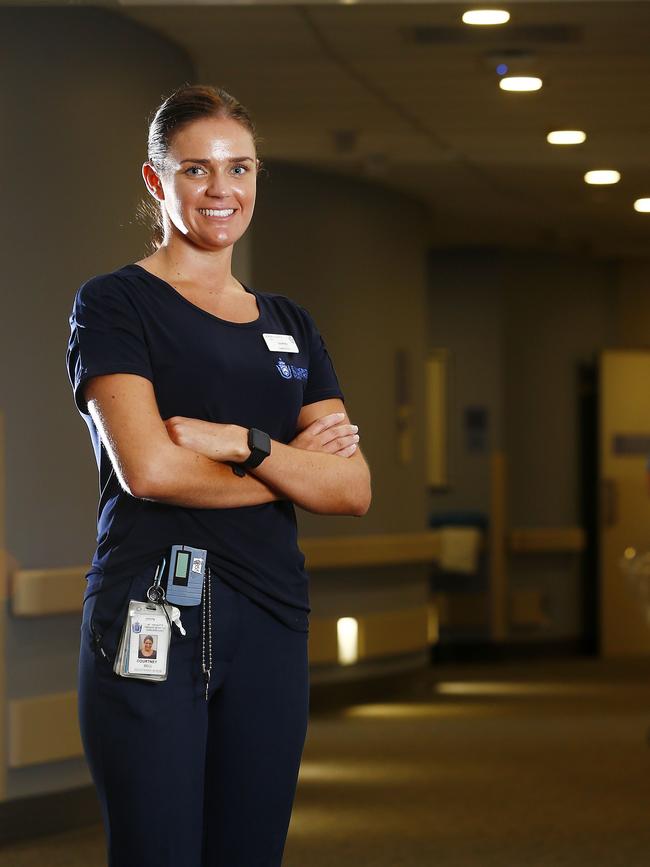
Courtney Bell is 25, a fully qualified nurse. She attended school at Our Lady of the Sacred Heart College in Kensington, has two younger brothers, one working with a trading company, the other still at school in Year 11.
“I never considered any career other than nursing, ” she tells me. And she has no intention of changing her mind.
“There are so many areas of specialisation open to nurses these days. I have a lot of students who come though the ward that I’ve precepted. I do enjoy the teaching aspect of my job.”
Nurses are a vulnerable lot.
A profound sense of duty precludes them from going on strike. With other undervalued groups of workers such a teachers, a strike is an option in pursuit of a fair go, but one can only imagine the chaos that would ensue if nurses downed tools and left patients to stew in their beds.
“I sometimes think that we’re taken for granted by the public,” says Bell.
“The public doesn’t always have a clear view of what nurses really do, the depth of our job. It’s not just a case of coming in, taking temperatures, doing blood pressure tests, checking pulse rates. Patients are vulnerable and need support beyond just physical wellbeing, emotional support.”
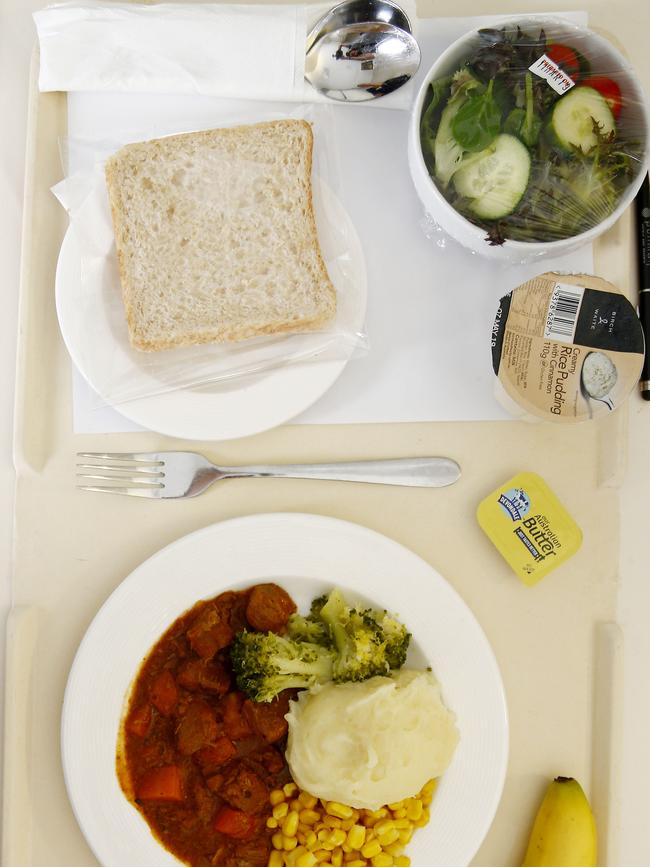
Are nurses adequately rewarded? After all, the public continually reads of crises.
Media reports follow a familiar pattern: “NSW is on the cusp of a nursing crisis, with southwest Sydney set to face a ‘catastrophic’ shortage of staff,” ran a news piece in early 2019.
Here’s another: “Australian nurses are feeling disheartened and underappreciated with several surveys finding increasing numbers of nurses are considering leaving their job and even exiting the profession.”
And another: “The exodus from the nursing profession, which fell during the global financial crisis, is expected to rise in the next few years as nurses explore greener pastures.”
Is this a reality and if so, what can be done to improve current conditions?
“The union goes into battle for us and we’re always getting small rises but we get the feeling that bit by bit, funds are being chipped away. But we are better off than so many countries. If you look worldwide, we’re lucky to have the healthcare we have.”
I ask if she’s ever encountered difficult patients and receive a slight smile and a diplomatic two-word answer — “That happens.”
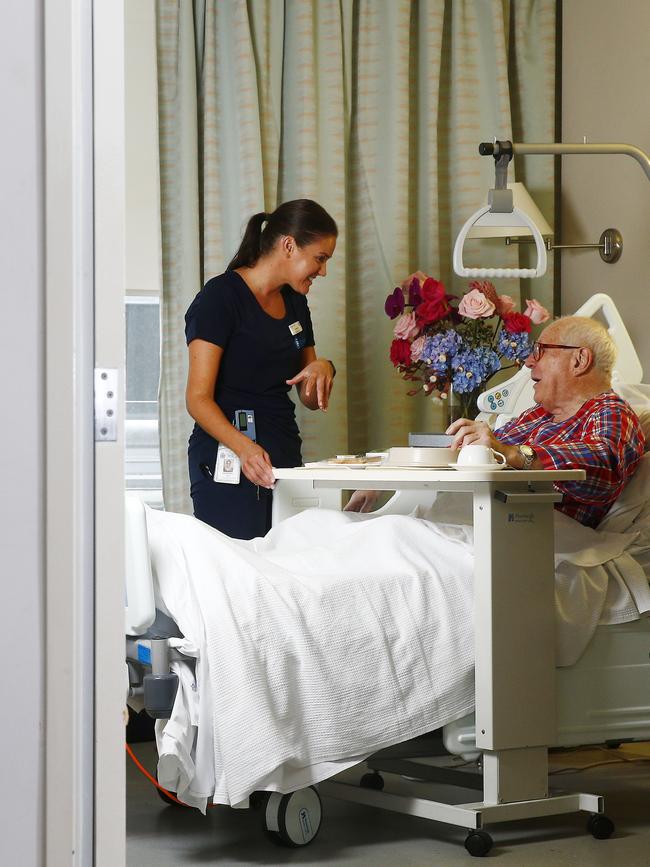
And about her heroines, expecting the names of nursing legends such as Florence Nightingale. “You know, it sounds funny, but I’d say my mother,” she says.
How does she relax? Does she dine out? “You finish at 10 and you don’t really think about much other than getting to bed especially if you’re on a morning shift as well. But then, given that Sydney is lamentably served for late night dining, this response is unsurprising.
If she does need to unwind after work she usually goes to the gym. She emphasises the camaraderie that even to a patient like me is palpable.
“I love this ward. We all get along very well, the young and the older,” says Courtney.
Lunch arrives. Not exactly the Ritz, or even the Hilton — with hundreds of patients needing to be fed three times a day, one would hardly expect the chefs to concern themselves with falderals and fancy presentation — but it’s perfectly edible and tasty and represents a titanic advance on the kind of tucker I was used to in boarding school.
I enjoy chatting with this young woman, so intelligent, cheerful. She clearly adores her profession and is unlikely to be among the 15 per cent of the 600 nurses surveyed in a national study by Monash University found would be “likely to leave the nursing profession during the next year”.
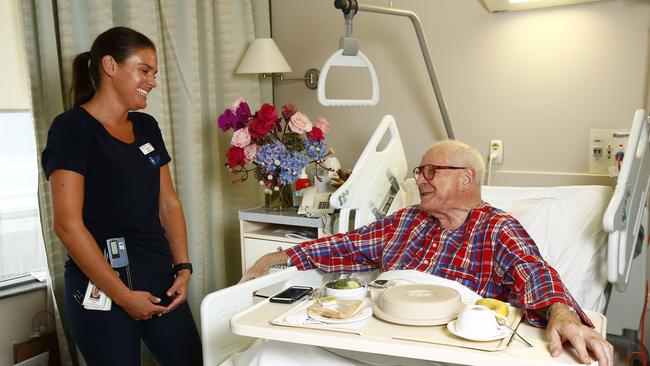
After Vinnie’s, I head to nearby St Luke’s for a week of rehab. The atmosphere here is quite different from that at Vinnie’s, less surgical. And as far as the nursing and the physiotherapy staff, a different word, a cosmopolitan mix of professionals from the UK, Nigeria, all over Asia and a large peppering of perky nurses from Ireland. Also, Thomas from China, Kenneth from Korea and Beau from Mooloolaba.
My contact with the nursing profession was far from a Monash University research study. A fortnight’s worth of personal processing in the health system and multiple conversations with nurses, it became that the profession is no longer prenominal female and an increasing number of males are considering nursing as a profession. It’s a reverse of the push for gender parity in business, politics.
More jobs for the boys. Time was when the word “doctor” invariably signified a male. Not any more. Change is afoot in the wards.
Here’s to the new look and a big shout out for the dedicated persons who choose to work in this noblest of professions.
St Vincent’s Hospital, Sydney, can be found at 390 Victoria St, Darlinghurst. The hospital is offering the following guidelines on how to protect yourself from COVID-19:
• Make sure to clean your hands frequently and thoroughly. This means washing for at least 20 seconds with soap and water, or an alcohol-based hand rub.
• Cover your nose and mouth when coughing and sneezing with tissue or a flexed elbow.
• Avoid close contact with anyone with cold or flu-like symptoms.
• Make sure you stay home if you are sick.
• For more information visit health.nsw.gov.au
